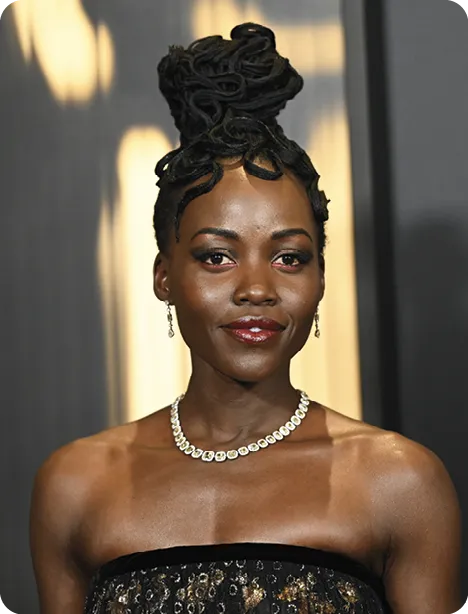Unit 3
Activity 3
My hair, my voice
Ressource affichée de l'autre côté.
Faites défiler pour voir la suite.
Faites défiler pour voir la suite.
Texte
Time to celebrate!
World Afro Day, celebrated on the 15th of September, is more than just an event it's a powerful movement of celebration and liberation. As founder Michelle De Leon describes it, this global day is dedicated to honouring Afro hair and the identities it represents. For too long, Afro hair has been subject to discrimination, shame, and the pressure to conform to narrow beauty standards. But World Afro Day challenges that narrative, reclaiming Afro hair as a symbol of beauty, strength, and cultural pride. This day uplifts Afro hair as a reflection of heritage and identity, encouraging us to embrace what makes us unique rather than hide it. [...]
Oscar winner Lupita Nyong'o has made it clear that her natural hair is more than just a style — it's a statement. Whether on red carpets, in films, or on magazine covers, Lupita consistently chooses to wear her natural texture, challenging the narrative that kinky, African hair is less beautiful. In an interview with Porter magazine, she shared that her mission is to inspire young people of colour to embrace their natural beauty. “I want kids to know they're beautiful just the way they are,” she said, rejecting the idea that Black hair is uncivilised or unprofessional.
Her children's book, Sulwe, further spreads this message, telling the story of a young girl's journey to self-love. It was inspired by Lupita's own experience growing up with dark skin and natural hair in a world that often celebrates lighter complexions and straighter hair. Lupita understands firsthand the importance of reaching children before they internalise harmful beauty standards.
When Grazia magazine photoshopped her hair out of a cover in 2017, Lupita didn't stay silent. She took to Instagram, writing, “I cannot support the omission of my native heritage.” Her message was clear: Black beauty, in all its forms, deserves to be seen and celebrated. With the hashtag #dtmh — don't touch my hair — Lupita reinforced that her natural hair is a proud reflection of her identity.
Oscar winner Lupita Nyong'o has made it clear that her natural hair is more than just a style — it's a statement. Whether on red carpets, in films, or on magazine covers, Lupita consistently chooses to wear her natural texture, challenging the narrative that kinky, African hair is less beautiful. In an interview with Porter magazine, she shared that her mission is to inspire young people of colour to embrace their natural beauty. “I want kids to know they're beautiful just the way they are,” she said, rejecting the idea that Black hair is uncivilised or unprofessional.
Her children's book, Sulwe, further spreads this message, telling the story of a young girl's journey to self-love. It was inspired by Lupita's own experience growing up with dark skin and natural hair in a world that often celebrates lighter complexions and straighter hair. Lupita understands firsthand the importance of reaching children before they internalise harmful beauty standards.
When Grazia magazine photoshopped her hair out of a cover in 2017, Lupita didn't stay silent. She took to Instagram, writing, “I cannot support the omission of my native heritage.” Her message was clear: Black beauty, in all its forms, deserves to be seen and celebrated. With the hashtag #dtmh — don't touch my hair — Lupita reinforced that her natural hair is a proud reflection of her identity.
Ressource affichée de l'autre côté.
Faites défiler pour voir la suite.
Faites défiler pour voir la suite.


Lupita Nyong'o in 2024.
Ressource affichée de l'autre côté.
Faites défiler pour voir la suite.
Faites défiler pour voir la suite.
Michelle Obama, former First Lady of the U.S. (2009-2017), is a lawyer, author, and advocate. In her memoir Becoming (2018), she reflects on the pressure to straighten her hair in the White House, fearing backlash if she wore it natural. Since then, she has embraced more natural styles, sparking conversations on identity and self-expression.
Ressource affichée de l'autre côté.
Faites défiler pour voir la suite.
Faites défiler pour voir la suite.
➜ La traduction de « crépu »
L'anglais est une langue très riche, il y a beaucoup de façons de traduire « crépu » : frizzy, noppy, kinky, coily et fuzzy.
L'anglais est une langue très riche, il y a beaucoup de façons de traduire « crépu » : frizzy, noppy, kinky, coily et fuzzy.
Ressource affichée de l'autre côté.
Faites défiler pour voir la suite.
Faites défiler pour voir la suite.
Questions
You are in charge of one document.
1
How does the celebrity in your document relate to her hair?
2
List the ways that she advocates for hair pride. How may her actions influence or help others with self-love and acceptance?
3
Pick out one quote from your document that represents its message.
Let's talk this out!
4
Share your quote with the other groups. Which one strikes you the most?
5
Sum up the actions for hair activism presented in the documents. Which one seems the most effective in your opinion? Can you think of others?
6
Do you know other celebrities who advocate for hair pride? Browse the web to find other examples.
Ressource affichée de l'autre côté.
Faites défiler pour voir la suite.
Faites défiler pour voir la suite.
Prepare five questions about what you have learnt on this double page. Quiz your partners.
Ressource affichée de l'autre côté.
Faites défiler pour voir la suite.
Faites défiler pour voir la suite.
The Afro pride talk show
The celebrities featured on this page are invited to a talk show to discuss the power of Afro hair in shaping their identity, breaking stereotypes, and reclaiming beauty on their own terms. Choose your role and act out the discussion sharing your journeys, struggles, and moments of pride.
The celebrities featured on this page are invited to a talk show to discuss the power of Afro hair in shaping their identity, breaking stereotypes, and reclaiming beauty on their own terms. Choose your role and act out the discussion sharing your journeys, struggles, and moments of pride.
Cliquez pour accéder à un module d'enregistrement audio
Enregistreur audio
Une erreur sur la page ? Une idée à proposer ?
Nos manuels sont collaboratifs, n'hésitez pas à nous en faire part.
j'ai une idée !
Oups, une coquille

